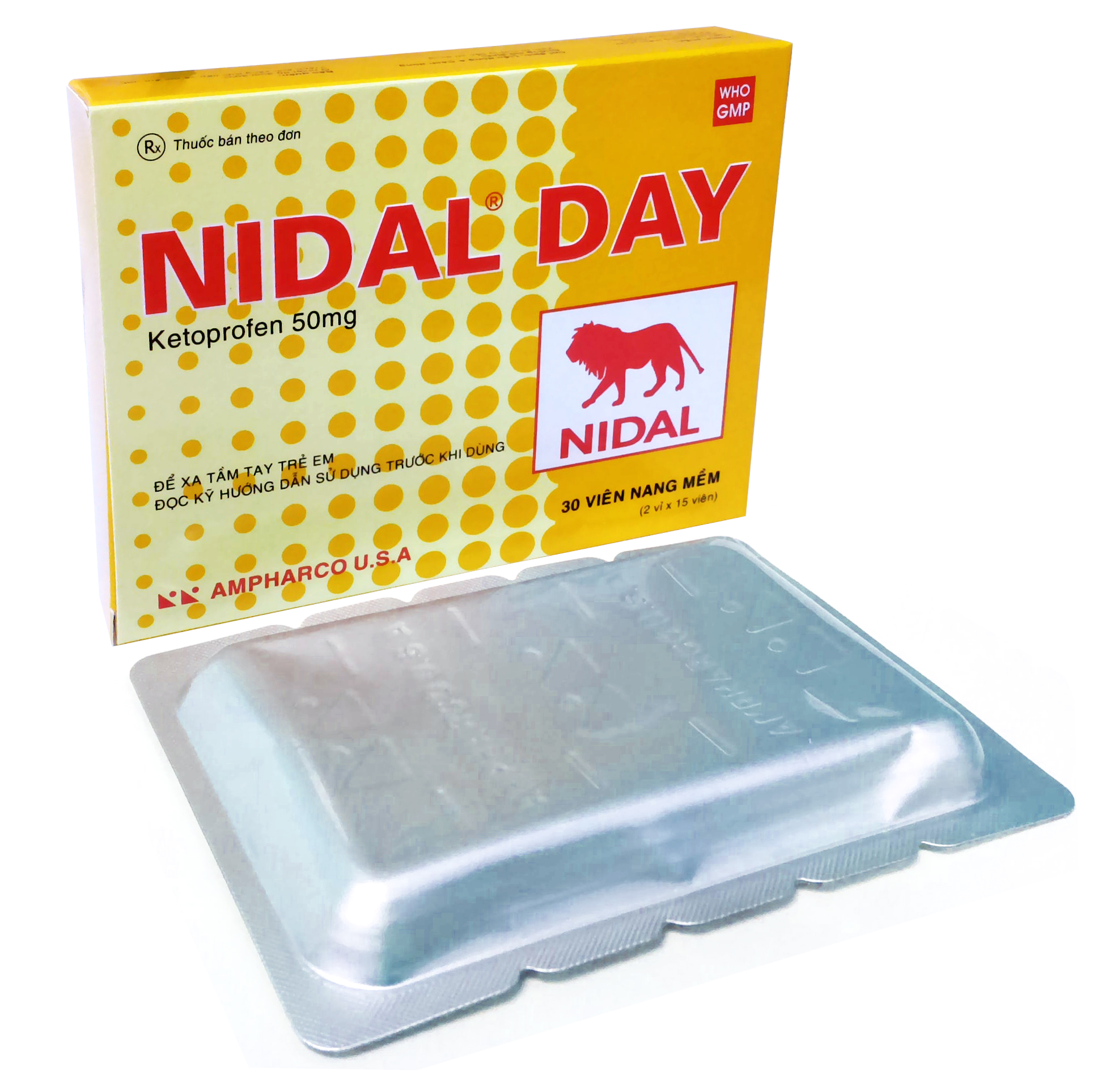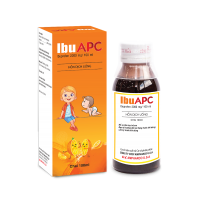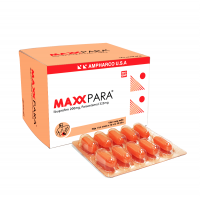NIDAL® DAY is indicated for:
- Treatment of rheumatoid arthritis and osteoarthritis.
- Treatment of acute gout attack.
- Management of pain in the following conditions:
- Pain due to problems with spine (such as ankylosing spondylitis, back pain).
- Acute musculoskeletal disorders
- Injuries (sprains and strains).
- Primary dysmenorrhea.
- Post – operation pain.
Specifications
NIDAL® DAY
COMPOSITION: Each soft capsule contains:
Ketoprofen................................................... 50 mg
Excipients:Polyethylene glycol, Potassium acetate, Povidone, Gelatin, Glycerin, Sorbitol, Methylparaben, Propylparaben, Ethyl vanillin, Sunset yellow, Allura red, Purified water.
INDICATIONS
NIDAL® DAY is indicated for:
- Treatment of rheumatoid arthritis and osteoarthritis.
- Treatment of acute gout attack.
- Management of pain in the following conditions:
- Pain due to problems with spine (such as ankylosing spondylitis, back pain).
- Acute musculoskeletal disorders
- Injuries (sprains and strains).
- Primary dysmenorrhea.
- Post – operation pain.
DOSAGE AND ADMINISTRATION
- For pain, inflammation, acute musculoskeletal disorders: 50 - 100 mg, 2 – 3 times/day.
- For primary dysmenorrhea: 50 mg, up to 3 times per day if needed.
- For renal and hepatic impairment patients: a reduce dose of 33 - 50% compare to normal.
- Mild renal impairment: maximum 150 mg/day.
- Moderate renal impairment: maximum 100 mg/day.
- Impaired hepatic function and serum albumin concentration < 3.5 g/dL: 100 mg/day.
Do not use over 300 mg ketoprofen per day. Drug should be taken within or after meals.
CONTRAINDICATIONS
- Hypersensitivity to ketoprofen or any other ingredients in this medicine.
- Patients who have experienced asthma, urticaria, or allergic-type reactions induced by aspirin or other NSAIDs.
- Pregnant women in the third trimester of pregnancy.
- Active peptic ulcer.
- Children under 15 years old.
- Severe heart failure
- Severe hepatic insufficiency
- Severe renal insufficiency
- Peri-operative pain in the setting of coronary artery bypass graft (CABG) surgery.
PRECAUTIONS
Undesirable effects may be minimised by using the lowest effective dose for the shortest duration necessary to control symptoms.
Ketoprofen should not be used to treat pain related to discreetly bleeding (pain after accident) or pain related to injuries in the nervous system as risk of bleeding.
Cardiovascular, Renal and Hepatic impairment:
At the start of treatment, renal function must be carefully monitored in patients with heart failure, liver dysfunction, cirrhosis and nephrosis, in patients receiving diuretic therapy, in patients with chronic renal impairment, particularly if the patient is elderly. In these patients, administration of ketoprofen may induce a reduction in renal blood flow caused by prostaglandin inhibition and lead to renal decomposition.
NSAIDs have also been reported to cause nephrotoxicity in various forms and this can lead to interstitial nephritis, nephrotic syndrome and renal failure.
In patients with abnormal liver function tests or with a history of liver disease, transaminase levels should be evaluated periodically, particularly during long-term therapy. Rare cases of jaundice and hepatitis have been described with ketoprofen.
Cardiovascular and cerebrovascular effects
Appropriate monitoring and advice are required for patients with a history of hypertension and/or mild to moderate congestive heart failure as fluid retention and oedema have been reported in association with NSAID therapy.
Clinical trial and epidemiological data suggest that use of some NSAIDs (particularly at high doses and in long-term treatment) may be associated with a small increased risk of arterial thrombotic events (for example myocardial infarction or stroke). There are insufficient data to exclude such a risk for ketoprofen.
Patients with uncontrolled hypertension, congestive heart failure, established ischaemic heart disease, peripheral arterial disease, and/or cerebrovascular disease should only be treated with ketoprofen after careful consideration. Similar consideration should be made before initiating long-term treatment in patients with risk factors for cardiovascular disease (e.g. hypertension, hyperlipidaemia, diabetes mellitus, smoking).
Respiratory disorders:
Patients with asthma combined with chronic rhinitis, chronic sinusitis, and/or nasal polyposis have a higher risk of allergy to aspirin and/or NSAIDs than the rest of the population. Administration of this medicinal product can cause asthma attacks or bronchospasm, particularly in subjects allergic to aspirin or NSAIDs.
Gastrointestinal bleeding, ulceration and perforation:
GI bleeding, ulceration or perforation, which can be fatal, has been reported with all NSAIDs at any time during treatment, with or without warning symptoms or a previous history of serious GI events.
Some epidemiological evidence suggests that ketoprofen may be associated with a high risk of serious gastrointestinal toxicity, relative to some other NSAIDs, especially at high doses.
The risk of GI bleeding, ulceration or perforation is higher with increasing NSAlD doses, in patients with a history of ulcer, particularly if complicated with haemorrhage or perforation, and in the elderly. Elderly patients should commence treatment on the lowest dose available. Combination therapy with protective agents (e.g. misoprostol or proton pump inhibitors) should be considered for these patients, and also for patients requiring concomitant low dose aspirin, or other drugs likely to increase gastrointestinal risk. Ketoprofen should not be used in patients with any history of peptic ulceration.
NSAIDs should be given with care to patients with a history of gastrointestinal disease (e.g. ulcerative colitis, Crohn's disease) as these conditions may be exacerbated.
Patients with a history of gastrointestinal toxicity, particularly when elderly, should report any unusual abdominal symptoms (especially GI bleeding), particularly in the initial stages of treatment.
Caution should be advised in patients receiving concomitant medications which could increase the risk of ulceration or bleeding, such as oral corticosteroids, or anticoagulants such as warfarin, selective serotonin-reuptake inhibitors or anti-platelet agents such as aspirin.
When GI bleeding or ulceration occurs in patients receiving ketoprofen, the treatment should be withdrawn.
Pediatric use
Safety and effectiveness in pediatric patients have not been established.
Geriatric use
As with any NSAIDs, caution should be exercised in treating the elderly (65 years and older).
PREGNANCY AND NURSING MOTHERS
Pregnancy:
Inhibition of prostaglandin synthesis may adversely affect the pregnancy and/or the embryo/foetal development. Data from epidemiological studies suggest an increased risk of miscarriage and of cardiac malformation and gastroschisis after use of a prostaglandin synthesis inhibitor in early pregnancy. The absolute risk for cardiovascular malformation was increased from less than 1%, up to approximately 1.5%. The risk is believed to increase with dose and duration of therapy. During the first and second trimester of pregnancy, ketoprofen should not be given unless clearly necessary. If ketoprofen is used by a woman attempting to conceive, or during the first and second trimester of pregnancy, the dose should be kept as low and duration of treatment as short as possible.
During the third trimester of pregnancy, all prostaglandin synthesis inhibitors may expose the foetus to:
- Cardiopulmonary toxicity (with premature closure of the ductus arteriosus and pulmonary hypertension).
- Renal dysfunction, which may progress to renal failure with oligo-hydroamniosis;
- The mother and the neonate, at the end of the pregnancy, may be possible prolongation of bleeding time, an anti-aggregating effect which may occur even at very low doses.
- Inhibition of uterine contractions resulting in delayed or prolonged labour.
Consequently, ketoprofen is contraindicated during the third trimester of pregnancy.
Nursing mothers:
It is not known whether this drug is excreted in human milk. As with other drugs that are excreted in milk, ketoprofen is not recommended for use in nursing mothers.
EFFECTS ON ABILITY TO DRIVE AND USE MACHINES
Using ketoprofen may make the patient feels dizzy, sleepy and affect eyesight. Therefore, it is advisable that patient should not drive or operate any machine, unless they are certain regarding the effect of the drug on them as well as if they can undertake such activities safely.
PRESENTATION: Aluminium – PVC blister of 10 soft capsules, 3 blisters/ aluminium pouch/ box.
Keep out of reach of children
Read the package insert carefully before use
Ask your doctor for further information
Use upon doctor’s prescription only
Manufactured and distributed by: AMPHARCO U.S.A PHARMACEUTICAL JOINT-STOCK COMPANY
Nhon Trach 3 Industrial Park, Hiep Phuoc Ward, Nhon Trach District, Dong Nai Province.
Tel: 02513 566 202 - Fax: 02513 566 203











